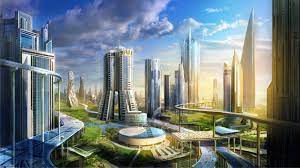Embracing the Future: The Convergence of Technology and Humanity
 |
| Futue of world and technology |
Introduction:
The rapid advancement of technology is reshaping every aspect of our lives, from the way we work and communicate to how we access information and engage with the world around us. As we stand on the precipice of a new era defined by innovation and progress, it's essential to explore the potential impact of technology on the future of our world.
Transforming Industries:
Technology has the power to revolutionize industries, unlocking new opportunities for growth, efficiency, and sustainability. In the field of healthcare, for example, advancements in artificial intelligence (AI) and data analytics are enabling more accurate diagnoses, personalized treatment plans, and predictive care models. Similarly, in agriculture, precision farming techniques and IoT-enabled devices are optimizing crop yields, conserving resources, and reducing environmental impact.
The Future of Work:
The rise of automation, robotics, and AI is transforming the nature of work, creating new possibilities and challenges for the global workforce. While some fear the displacement of jobs due to technological advancements, others see an opportunity for innovation and adaptation. By embracing lifelong learning, upskilling, and reskilling initiatives, workers can prepare themselves for the jobs of tomorrow and thrive in an increasingly digital and interconnected world.
Empowering Communities:
Technology has the potential to empower communities and bridge the digital divide, providing access to information, education, and opportunities for socio-economic advancement. Initiatives such as digital literacy programs, community-owned internet infrastructure, and inclusive design practices can help ensure that all individuals have the tools and resources they need to participate fully in the digital economy.
Addressing Global Challenges:
In the face of pressing global challenges such as climate change, resource scarcity, and public health crises, technology offers innovative solutions and pathways to sustainability. Renewable energy technologies, smart city initiatives, and data-driven approaches to environmental conservation can help mitigate the impact of human activities on the planet and build a more resilient and equitable future for all.
Ethical Considerations:
As we embrace the promise of technology, it's crucial to address ethical considerations and ensure that innovation is guided by principles of fairness, transparency, and human dignity. Issues such as data privacy, algorithmic bias, and the responsible use of emerging technologies require careful attention and ongoing dialogue among stakeholders to ensure that technology serves the greater good and advances human well-being.
Conclusion:
The future of our world with technology is both exciting and uncertain, filled with boundless potential and unprecedented challenges. By harnessing the power of innovation, collaboration, and responsible stewardship, we can navigate this ever-evolving landscape with confidence and purpose, building a future that is inclusive, sustainable, and equitable for all. Together, we have the opportunity to shape a world where technology enriches our lives, empowers our communities, and enables us to reach new heights of human achievement.
Comments
Post a Comment